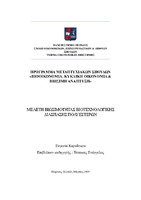Μελέτη βιωσιμότητας βιοτεχνολογικής διάσπασης πολυεστέρων
Sustainability study of biotechnological degradation of polyesters

View/
Keywords
Βιοαποικοδόμηση ; Βιοπολυμερή ; Πολυεστέρες ; Διαχείριση πλαστικών αποβλήτων ; Ενζυμική αποικοδόμηση ; Διάσπαση πολυεστερικών ; Λιπάσες ; Εστεράσες ; Αποπολυμεράσες ; Κουτινάση ; Πρωτεάσες ; Υπεροξειδάσες ; Μικροβιακή αποικοδόμηση ; PET ; PCL ; PBS ; PHB ; PLA ; PEA ; PTT ; PEN ; PU ; Θερμοπλαστικά υλικά ; Πολυουρεθανικά υλικά ; Θερμοσκληρυνόμενα υλικά ; Βιοδιασπώμενα υλικά ; Μικροπλαστικά ; Βιοτεχνολογική διάσπασηAbstract
This thesis focuses on the viability of biotechnological degradation of polyester polymers as a plastic waste management strategy. Plastic pollution is one of the greatest environmental challenges of the 21st century, with conventional management methods presenting limitations in terms of effectiveness and large-scale implementation. This research centers on modern biotechnological methods for the degradation of polyester polymers, examining the role of enzymes and microorganisms in their biodegradation. The physicochemical properties of polyester polymers and the challenges they pose during recycling and degradation processes are analyzed. Emphasis is placed on the action of enzymes such as lipases, esterases, and depolymerases, as well as the factors affecting their activity. These factors include pH, temperature, and the presence of specific chemical compounds or cofactors that either facilitate or inhibit enzymatic action.
Furthermore, the study explores the most widely used polyester polymers, such as poly(ethylene terephthalate) (PET), poly(butylene succinate) (PBS), and poly(ε-caprolactone) (PCL), comparing their degradation under laboratory and natural conditions. Additionally, it examines the potential applications of biotechnological degradation on an industrial scale, analyzing challenges related to enzyme efficiency, production costs, and the sustainability of the methods. The research also discusses recent advances in genetic engineering and synthetic biology that enable the optimization of enzymes with enhanced degradative capacity and stability under various conditions. Significant emphasis is placed on the comparison between biodegradable and non-biodegradable polyester polymers, highlighting the potential for replacing conventional polymers with environmentally friendly materials.
Moreover, the thesis evaluates strategies for integrating biotechnological degradation into existing recycling practices, contributing to the promotion of a circular economy and reducing dependence on petrochemical products.


